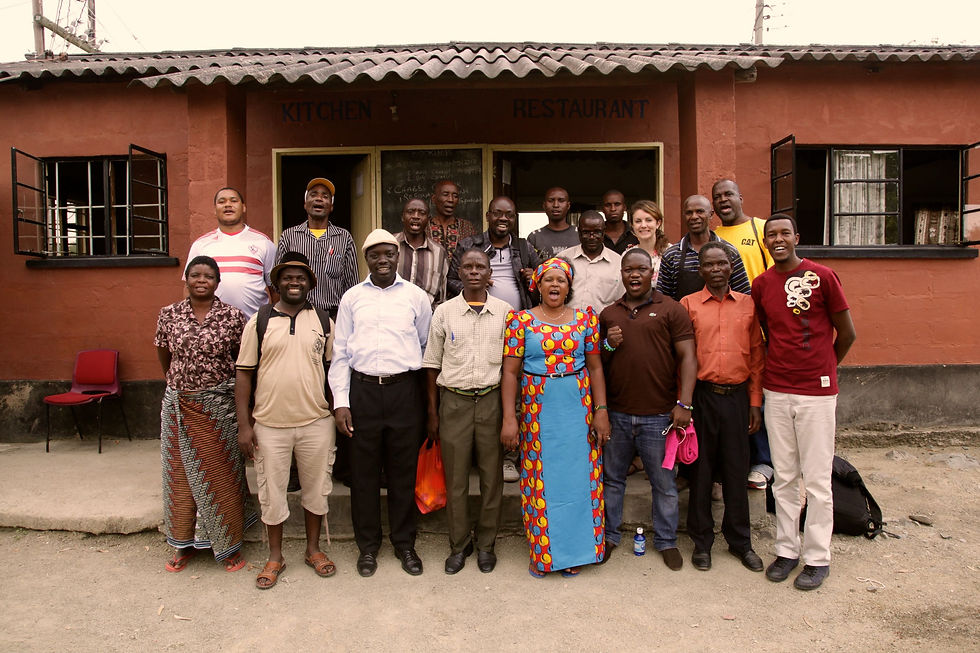
Fresh from CHGN’s first Africa Forum, our Communications Co-Ordinator Jake shares some of what he learned.
Given the purpose of my job, I really shouldn’t admit this: I have often found it difficult to explain how CHGN works. On the one hand, it’s as simple as following the commandment to ‘love your neighbour’. On the other, it’s as complex as trying to completely change how international development works. Add to this, each of our Clusters of local people exist in very different communities, and pursue quite different aims, and so what unites our network is not always apparent at first sight. Luckily, however, I’ve just returned from CHGN’s first Africa Forum in Zambia. Over the course of four days, I got to know Cluster members from Sierra Leone, Kenya, Tanzania and Zambia, as they shared insights with each other. These experiences, tools and ideas will now inform and strengthen what each Cluster does in their community, but they have also brought a new clarity to my own work as well. In short, I learned that CHGN’s approach, at its root, is almost a complete reversal of how international development ordinarily works. Whereas international development typically identifies problems in a community, and then finds outsiders to work out ways to sort it out, CHGN involves local people coming together to figure out their strengths, not their needs. Only after taking stock of these strengths do they identify what they want to achieve, and then use their strengths to pursue them. Our wider network exists to fill in any gaps they identify, through training and support, which was exactly the purpose of the Africa Forum. Admittedly, a shift in focus from needs to strengths might seem a simple (even simplistic) change. But the forum showed me just how much impact it can have. I got to hear how previous development projects in Cluster members' communities had the unintended consequence of defining local people as incapable, of diminishing their prior achievements, and of discouraging their future initiative. I then learned how CHGN’s model is building stronger community relationships; is forging inspiring leaders; is kindling an entrepreneurial spirit; and is bringing greater health and wellbeing throughout a community. I’m not pretending this process is conducted simply, nor that it produces quick results, or that CHGN has all the answers, but at the forum we all heard testimonies that back up our model. For example:
Cluster members from Kericho in Kenya told us how by mapping existing community organisations in their town, they are preventing duplication of effort and resources being wasted, which strengthens their efforts to reduce drug and substance abuse, and to improve disability rights.
Cluster members from Gwembe in Zambia told us how simply by a concerted effort to listen to everyone in their rural community, they have discovered cost-free solutions to entrenched problems, including an ingenious method to build stronger latrines (using local wood and imitating the structure of bee hives).
Cluster members from Freetown in Sierra Leone (our newest Cluster) told us how local Muslim-Christian relations forged during Ebola and civil war were key to resolving both crises.
Cluster members from Musoma in Tanzania told us how they use community legal services to make vulnerable people more aware of their rights, notably in their work to reduce Female Genital Mutilation.
All this said, the purpose of the forum was not to teach me how to do my job properly. Rather, it was to help Clusters to do theirs even better. And so at the end of it I asked everyone to tell me one thing they had learned. Three answers cropped up most frequently: 1. Social Enterprise Clusters do not generate many costs: they volunteer their time, and a small contribution is given by CHGN to help facilitate the Cluster's work. Each Cluster works towards covering these costs themselves, following the example already set by our oldest Cluster in Uttarakhand, India. And so one focus of the forum was on income-generating activities that serve the community. We had training from a Zambian community worker on some of the practicalities of this, like making a business plan, and being sensible with finances. This training will now help support plans like those of the Zambia Cluster, who have some Cluster-owned cows to help generate income, and who want to set up a community hardware store - in a similar vein to this ‘library of things’ - which could have great benefit to the subsistence farmers in their rural community. 2. Storytelling One of our hosts at the forum was Elvis, a now-retired adviser to Zambia’s Ministry of Health. He described the approach taken by Clusters as having the potential to "shake the world". But to do this, we first need to tell more people about what we do. For many Cluster members who have worked with other development organisations, telling people about their work has often involved writing lengthy reports to donors, which might not be read. At the forum I got to use my own experience of working at the BBC to inform a discussion on alternative ways of recording Cluster stories, to tell them in a simple and engaging way. 3. Community Listening Skills ‘SALT’ (Strengths; Appreciate; Learn; Transfer) is an acronym that often pops up within our network. It describes a simple form of dialogue between a Cluster and community members, or local organisations, one that focuses on identifying things that they do that safeguard the health and wellbeing of those they care about. By simply visiting community members in their homes, or visiting organisations where they work, discussing these things, drawing out lessons, and sharing with others, remarkable things can happen. The Zambia Cluster are testament to this. The network of villages in which they live are difficult to access (our minibus had a flat tyre on the way there and on the way back), and financially poor (most are subsistence farmers). Despite this isolation and poverty, through SALT the Cluster have seen significant improvements in maternal health, sanitation, and community spirit, through this SALT process. Our other Clusters are keen to implement this process where they live. These are just a few highlights from the forum. We’ll share more over the coming weeks: through our new podcast, on our blog, and on social media. Stay tuned!





